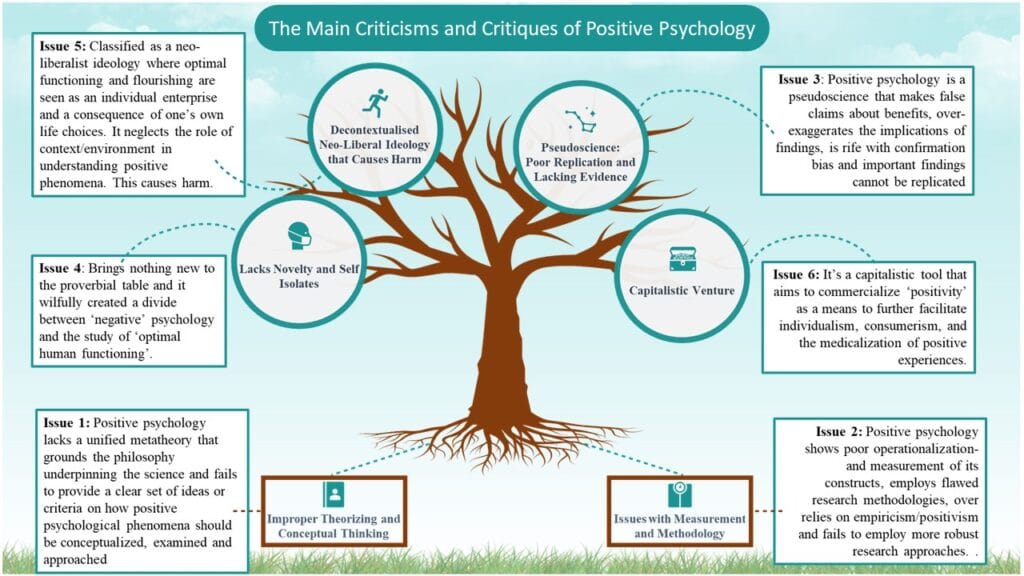Positive psychology is a field within psychology that aims to uncover the secrets of human flourishing and well-being. It focuses on promoting happiness, resilience, and optimal functioning, and has gained widespread popularity in practice. However, like any discipline, it has its critics who have questioned various aspects of positive psychology ranging from its novelty, to the validity of the theories, tools, and interventions on which it is built.
A recent systematic literature review on the criticisms of positive psychology, co-authored by myself and Gaffaney, Van Der Vaart, Dik and Donaldson (2023), revealed that critics thought positive psychology:
- lacked proper theorizing and conceptual thinking
- was problematic as far as measurement and methodologies were concerned
- was seen as a pseudoscience that lacked evidence and had poor replication
- lacked novelty and self-isolated from mainstream psychology
- was a decontextualized neo-liberalist ideology that caused harm
- was a capitalistic venture (c.f Figure 1)
In this article, I will delve into these concerns and discuss the path forward toward a more inclusive, ethical, and scientifically sound discipline.

Figure 1. Summary of the Main Criticisms and Critiques of Positive Psychology
1. Lack of proper theorizing and conceptual thinking.
Critics argue that positive psychology lacks a unifying theory that underpins its philosophy of science. They claim that it fails to provide a clear set of ideas and principles on how positive psychological phenomena should be understood and approached. In reality, positive psychologists have actively debated the philosophical beliefs driving the discipline to establish consensus as to the most suitable methods, terminologies, and types of theories required to take the field forward.
Recent contributions by researchers such as Ciarrochi, Wissing, Lomas, Seligman, and others have aimed to clarify the philosophical position of positive psychology and provide explicit criteria for theory development, methods, and approaches. They emphasize the need for contextually relevant theories, cultural and linguistic approaches, qualitative and mixed-method methodologies, and advanced computational analysis. Positive psychology should also embrace alternative perspectives to enhance its understanding of positive psychological phenomena. Furthermore, they highlight the importance of embedding theories and methods within the meta-assumptions of positive psychology in order to clarify its view of human nature and positive psychological phenomena.
Despite the progress, there are indeed still areas that require further clarification, including its meta-theoretical assumptions, and the development of a comprehensive theory of human development. Positive psychology should also embrace alternative perspectives, such as postpositivism and constructive interpretivism, to enhance its understanding of positive psychological phenomena. Moreover, the field should focus on ethical decision-making models and refrain from sensationalism. By learning from other areas of psychology, positive psychology can adopt a multi-level interdisciplinary approach that appreciates diverse perspectives and encourages collaboration with adjacent fields. This approach allows for a more holistic understanding of human flourishing and acknowledges that explaining a phenomenon at one level does not exclude other levels. While complete consensus on all philosophical issues may be unrealistic, critics should recognize that fields like personality psychology operate with different theoretical perspectives and still contribute valuable insights through ideological pluralism and building upon each other’s findings and limitations.
2. Issues with positive psychology’s measurements and research methodologies.
Critics argue that positive psychology shows poor operationalization and measurement of its constructs, uses flawed methods, and over-relies on empirical research. They critiqued its heavy reliance on quantitative research and the use of self-report measures, its preference for cross-sectional designs, and making causal inferences based on anecdotal evidence. However, these issues are not unique to positive psychology but are prevalent in psychology as a whole. As a relatively new field, positive psychology has followed common research practices in its early stages, using simple methodologies and measures to explore novel phenomena.
To address these concerns, positive psychology should strive for more rigorous development and validation of measurement instruments that adhere to established guidelines. Researchers should critically evaluate new constructs and assessment measures while considering cross-cultural fairness. Additionally, positive psychology should embrace more innovative and objective assessment methods and utilize longitudinal, experimental, qualitative, and mixed-method approaches. By moving away from reductionist thinking and engaging in more phenomenological work, positive psychology can deepen its understanding of psychological experiences.
3. Perceived as a pseudoscience lacking evidence and replicability.
Critics argue that positive psychology makes false claims (e.g. developing positive states extends longevity of cancer patients), exaggerates findings (e.g. a happy worker will always be a productive worker), and lacks replication of important studies (e.g. the effectiveness of the three good things intervention can not be replicated). While these critiques have valid concerns, labeling positive psychology as a pseudoscience is an exaggeration. While there are inconsistencies in the terminologies and theories, positive psychological constructs are generally well-defined and testable.
It is true, however, that the discipline faces challenges regarding self-correction, confirmation bias, exaggerated claims, and poor replication. Positive psychology should foster a culture of self-correction, open debate, and transparency to strengthen its scientific standing. Embracing open science practices, pre-registration of studies, and open peer review processes will enhance its credibility and mitigate biases, reinforcing scientific integrity. Positive psychological journals should also invite reviewers from different fields as a means to be more open to scrutiny. This allows for open debate about issues but also provides an opportunity to learn and grow through different perspectives.
4. Lacks novelty and self-isolation from mainstream psychology
Critics argue that positive psychology isolates itself from mainstream psychology, perpetuating a divide between the study of positive and negative aspects of human experience. However, the discipline builds upon historical contributions from other approaches (e.g. existentialism and the person-centered approach) and emphasizes the need for further development. Recent developments, such as Paul Wong’s work on the importance of suffering as a prerequisite for wellbeing/meaning, demonstrate a greater recognition of the value of “the negative” and thus shows a better alignment with mainstream psychology.
Challenges remain, such as the lack of clarity on the relationship between humanistic and positive psychology and the need to incorporate insights from other psychological approaches and domains. Positive psychology can benefit from integrating concepts from other domains, such as systems sciences, depth psychology, and advancements in neuroscience, decision sciences, environmental studies etc. By addressing these challenges and embracing interdisciplinary perspectives, positive psychology can continue to advance our understanding of the human condition.
5. Seen as a decontextualized neoliberal ideology that causes harm.
Positive psychology was classified as a Western-centric, neo-liberal ideology where optimal functioning and human flourishing are seen as an individual enterprise and a consequence of one’s own life choices. Critics argue that it neglects the role of the context/environment in its understanding of positive phenomena, which in turn causes harm.
By assuming Western values as universal, positive psychology neglects indigenous knowledge, cultural perspectives, and social contexts in its explanations of positive phenomena, ultimately pathologizing normal human behavior, perpetuating stereotypes, and marginalizing certain groups. The lack of cultural sensitivity and applicability to non-Western cultures reinforces stigma and creates unrealistic expectations about mental health and wellbeing.
Positive psychology should adopt a more culturally relevant and cross-cultural approach to address these concerns. This includes incorporating indigenous perspectives, conducting cross-cultural studies, and developing holistic indigenous positive psychological theories, methods, and interventions. It is crucial to consider the unique experiences of marginalized groups and involve them as co-developers of theories and approaches through participatory action research. Furthermore, positive psychology must establish ethical research and intervention guidelines to mitigate potential harm. By embracing these recommendations, positive psychology can evolve into a more inclusive and culturally sensitive field that better serves diverse populations.
6. Perceived as a capitalistic venture.
Critics contend that the commercialization of positive psychology fosters unrealistic expectations and capitalizes on people’s “chronic unhappiness.” While commercialization exists, it is important to consider the underlying intent. Rather than labeling something as inherently good or evil, it is the intent driving such and the societal implications that determine their impact. The popularity and commercial drivers behind positive psychological tools and techniques demonstrate their practical value and usefulness. Further, access to positive psychological resources is not limited to commercial ventures, as non-profit organizations and academic institutions also offer free access. However, positive psychology can narrow the supply and demand gap by fostering closer collaboration between science and practitioners and making more tools and techniques available to the public.
Conclusion
Although not all these criticisms and critiques are unique to positive psychology, they do provide a platform for self-reflection and improvement, allowing us to shape positive psychology into a discipline that meets the highest standards of scientific integrity and societal relevance. By heeding and actively engaging with these critiques, positive psychology can truly unlock the secrets of human flourishing and contribute to a more thriving and inclusive world.
References
Van Zyl, Gaffaney, Van der Vaart, Dik and Donaldson. (2023). The critiques and criticisms of positive psychology: A systematic review. The Journal of Positive Psychology. 1-30.





